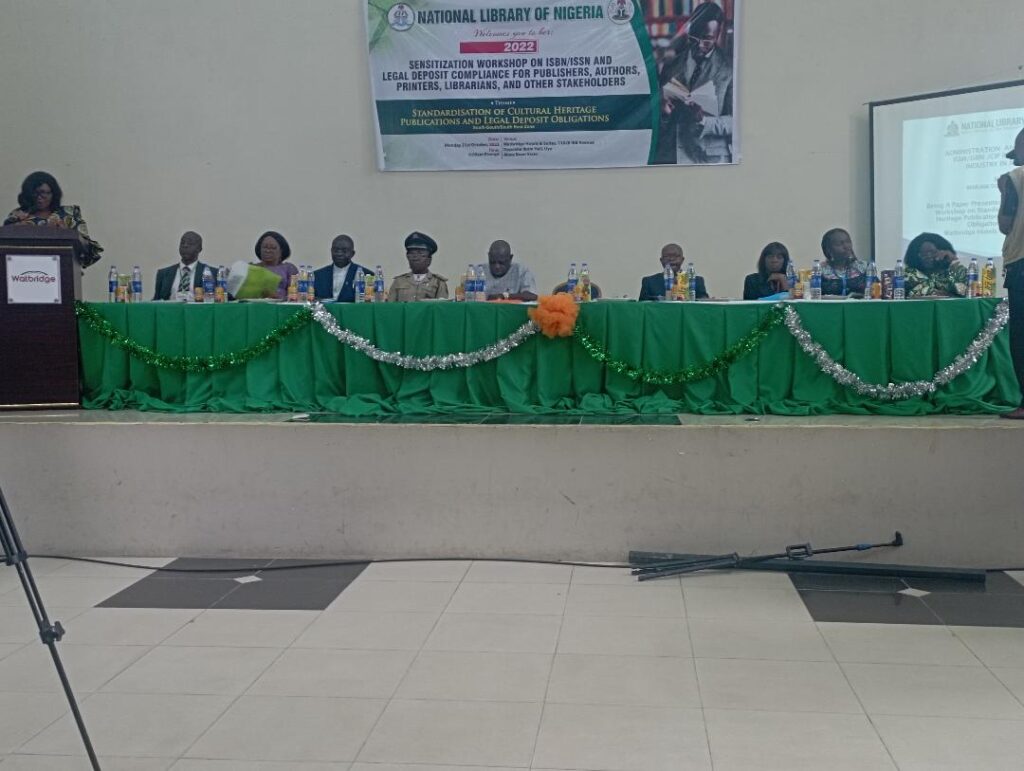Nigerian authors and publishers are enjoined to publish more in indigenous languages to avoid extinction of the languages.
The Chief Executive Officer of National Library of Nigeria, Professor Chinwe V. Anunobi noted that ‘‘Publishing in indigenous language plays a vital role in teaching and learning situations.
‘‘It is, however, sad to note that Nigeria, a multilingual nation with over 250 living languages, seems to be reluctant to tap into the benefits of using the mother tongue in her publications.’’
Read also: VILLAGE BOY Wins International Award
Giving the advice during a one-day sensitisation workshop on ‘‘Standardisation of cultural Heritage Publications and legal deposit obligations’’ for publishers, researchers, book sellers, printers, librarians, among others held at Watbridge Hotel and Suites, Uyo on Monday, Anunobi noted ‘‘One of the significant advantages of using indigenous languages in Nigerian publications is its positive impact on national cultural heritage.’’
‘‘Leveraging on indigenous language publications using Information and Communication and Technology (ICT) would be one of Nigeria’s most significant components of national identity.
‘‘No language (foreign or indigenous) is inferior to the other. Publishers can in fact translate existing publications in foreign languages into indigenous languages, which of course will require obtaining new ISBN or ISSN as the case may be,’’ the National librarian stated.
According to her, ‘‘Furthermore, most indigenous languages are on the verge of extinction. Therefore, authors and publishers are encouraged to publish more in indigenous languages. Writing in indigenous language will keep the language alive and thus retain the knowledge that they hold which may prove to be important and useful in the future.
‘‘The nation will also contribute more to the global information and knowledge society. There is a saying ‘When an elder dies we lose an entire library, but when a language is lost, we lose just as much- if not more.’’
She harped on the need for government to formalise relevant legal frameworks to guide the operations of the nation’s library and publishing subsector, saying that will grow the industry maximally in line with global best practices.
Speaking earlier, the Chairman of the session, Dr. Emmanuel Abraham, had described the workshop as timely and called for greater efforts to get ISSN and ISBN numbers for indigenous works and other cultural publications.
Abraham who is the founder of Topfaith University, Mkpatak in Essien Udim Local Government Area, equally called for the establishment of the library and publishing culture in schools and colleges.
He emphasised the need for authors and publishers to promote indigenous languages, and drew attention to challenges facing book publishing in the country to include high cost of printing materials, inferior material, plagiarism, invasion of privacy, activities of quacks, among others.
Also speaking, Rt Hon.(Barr.) Ekong Sampson made a case for creation of library superhighways to inculcate reading culture among the students and people.
The PDP Senatorial Candidate for Akwa Ibom South further called for effective legal deposits for the nation’s library and publishing industry.
According to him, the time has come for Nigeria to look closely at the legal framework surrounding the library and publishing to stir up a productive utilization of the sector.
The erudite former State Lawmaker said there was a need to explore trajectories of laws that will help broaden access to information and resources, noting that a lot of information is hidden or stored away in Nigeria. Dr. Sampson opined the need for necessary safeguards to make the library environment more interesting.
The former State Environment and Petroleum Resources Commissioner again reechoed his regular calls for the deepening of the reading culture in Nigeria, saying ‘the more we read, the safer we are as a people’.
He described the colloquium as timely, assuring that when elected into the Senate, he will pursue legislations that will give Nigerians the kind of intellectual atmosphere so widely clamoured for.
The workshop which featured eminent professors, writers, publishers and stakeholders in the library and publishing industry, also witnessed the signing of a Memorandum of Understanding between the National Library Association and Network of Book Clubs and Reading Promoters in Nigeria for the promotion of reading culture in Nigeria.
Among the dignitaries at the event were the President, Network of Book Clubs and Reading Promoters in Nigeria, Richard Mammah; Prof. Felicia Etim, Chief Librarian, Federal University, Otuoke; Prof. Philip Akor, Chief Librarian, Federal University of Science and Technology, Ikot Abasi, and Prof. Patrick Akpan who presented a goodwill message as well as Rev. Fr. Gerald F. Umoren of Akwa Ibom State University who delivered a keynote lecture.

